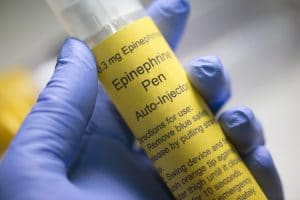Food and Drug Administration Warns EpiPens May Be Defective
 The FDA is a federal agency that has the responsibility for protecting and promoting public health. The agency regulates medical devices, drugs, and other healthcare products. EpiPen is the brand name for a medical device (an auto-injectable device) used to deliver epinephrine to patients. It’s generally used when people have allergic reactions.
The FDA is a federal agency that has the responsibility for protecting and promoting public health. The agency regulates medical devices, drugs, and other healthcare products. EpiPen is the brand name for a medical device (an auto-injectable device) used to deliver epinephrine to patients. It’s generally used when people have allergic reactions.
On March 24, 2020, FDA issued a warning about two auto injectors – EpiPen 0.3mg and EpiPen Jr 0.15 mg – and the authorized generic versions. FDA sent a letter to Pfizer and Mylan which manufacture EpiPen, warning Pfizer of the following defects.
- “Spontaneous activation caused by using sideways force to remove the blue safety release.” For example, someone who uses these EpiPens may try to use one hand to hold the EpiPen injector and then try to use their thumb (in a sideways force manner) to remove the blue safety release. FDA stats that prior to using these EpiPens, the blue safety release should be removed “by pulling straight up with one hand and holding the device with the other hand.”
- “Inadvertent or spontaneous activation due to a raised blue safety release.” A small number of these EpiPen devices may have a slightly raised blue safety device which may cause the device to activate too early – potentially preventing or delaying the emergency treatment.
- Difficulties in removing the injectors from the carrier tube. Some of the injectors may not easily slide out of the carrier tube or may not slide at all – because of a “slight deformation” on the carrier tube’s rim. The carrier tube is the immediate package for the auto-injector. Delays in being able to access the device can prevent or delay the injection of the medicine.
- User errors that can delay or prevent the epinephrine dosage
- The injectors won’t operate if the blue safety release is in place
- Users need to ensure the needle end of the injector contacts the upper leg of the user prior to and during activation.
- Users need to ensure the injector “is held in place for a minimum of three seconds following activation.”
Healthcare providers, caregivers, and patents should review the instructions to properly understand and use the auto-injectors.
The FDA letter continues by emphasizing how critical it is for “lifesaving products to work as designed in an emergency situation.” Pharmacists should inspect the devices before dispensing them to patients to ensure proper usage.
Products liability and medical devices
When medical devices such as the two EpiPens reviewed in the warning letter fail to work, they can prevent users from getting emergency treatment. The failure to use the device properly can be fatal.
Manufacturers, distributors, and sellers of defective products can be held strictly liable for any deaths or injuries that occur:
- If their product is defective at the time it is used
- The user dies or suffers an injury
- The defect is the cause of the death or injury
Families of anyone who dies due to a product defect have the right to file a wrongful death action against those companies responsible for the defect. Survivors have the right to file a personal injury action for their medical expenses, pain and suffering, and lost income.
If you were injured or a loved one was killed due to the failure or a medical device to work, a medication to work, or due to any product defect, the NJ medical device defect lawyers at Eichen Crutchlow Zaslow, LLP want to help. We have the experience and resources, including working with product safety experts, to help you get justice. To schedule a free consultation in our Edison, Red Bank, or Toms River office, call us today at 732-777-0100 or fill out our contact form.

Eichen Crutchlow Zaslow, LLP has purposely remained small in size, because it is important to us that we get to know our clients and their needs. Larger NJ injury firms may churn out case after case, but that’s not how we operate. Partners Barry Eichen, William Crutchlow, and Daryl Zaslow have created a firm with the resources to handle complex litigation, and a team that takes your case personally.
Find out more about Eichen Crutchlow Zaslow, LLP
